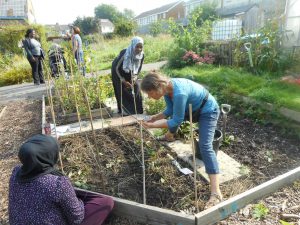I am passionate and curious about what the arts can bring to academic research, and I have worked for many years as an artist researcher mainly with women who are in the UK as refugees or seeking asylum. I love arts-led research processes but I find that striking a balance between hands-on practice and academic theory can be tricky. The truth is that although I am drawn to academia, I am cautious as well. My main concern is that – despite professing to be open to different forms of knowledge – some academics can disregard the embodied learning discovered through creative practice.
A second concern of mine is that the nuanced understandings we seek often require us to tolerate periods of time when we feel quite lost. It can be hard to hold your nerve in these wilderness phases, and trust that by following your nose you will find your way to the things you need to discover. Moreover, when this unknowing runs alongside a path in which the desire to know is very strong, subtleties can be overwhelmed and deep understandings lost.
My third concern (for now) is that insubstantial fragments of practice can be smothered when too much meaning is made from too slight an event. It is tempting to extrapolate from what seems to be a meaningful moment of practice, and in our enthusiasm we can reach conclusions that lack rigour. If you add to that all of our different agendas, the different knowledges we possess, and the many languages we speak, then our deductions can seem precarious at best.
In creative research practice, as in many other aspects of life, we need interpreters; hybrid practitioners who can translate across boundaries. We need to widen our gene pool and move away from the spindly, breathless features that are present when things become very specialized. We need robust, conversational ways of working; work that isn’t finished; work that is still in transit. Maybe, above all, we need to resist thinking that we know anything very much about anything.
Companion Planting allotment project, connecting people through creative practice and organic gardening.
About Luci
My professional life began in the world of physical theatre but I gradually migrated to the realm of visual arts. My work revolves around themes of childhood, place and belonging, and I work with people who find themselves on the margins, developing flexible and responsive processes that allow us to think imaginatively with ourselves and each other. Issues of access, inclusion and engagement are integral to my work, and I see my practice contributing to a community of disciplines that embraces family support, health services, academic research, and education.
